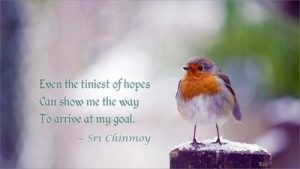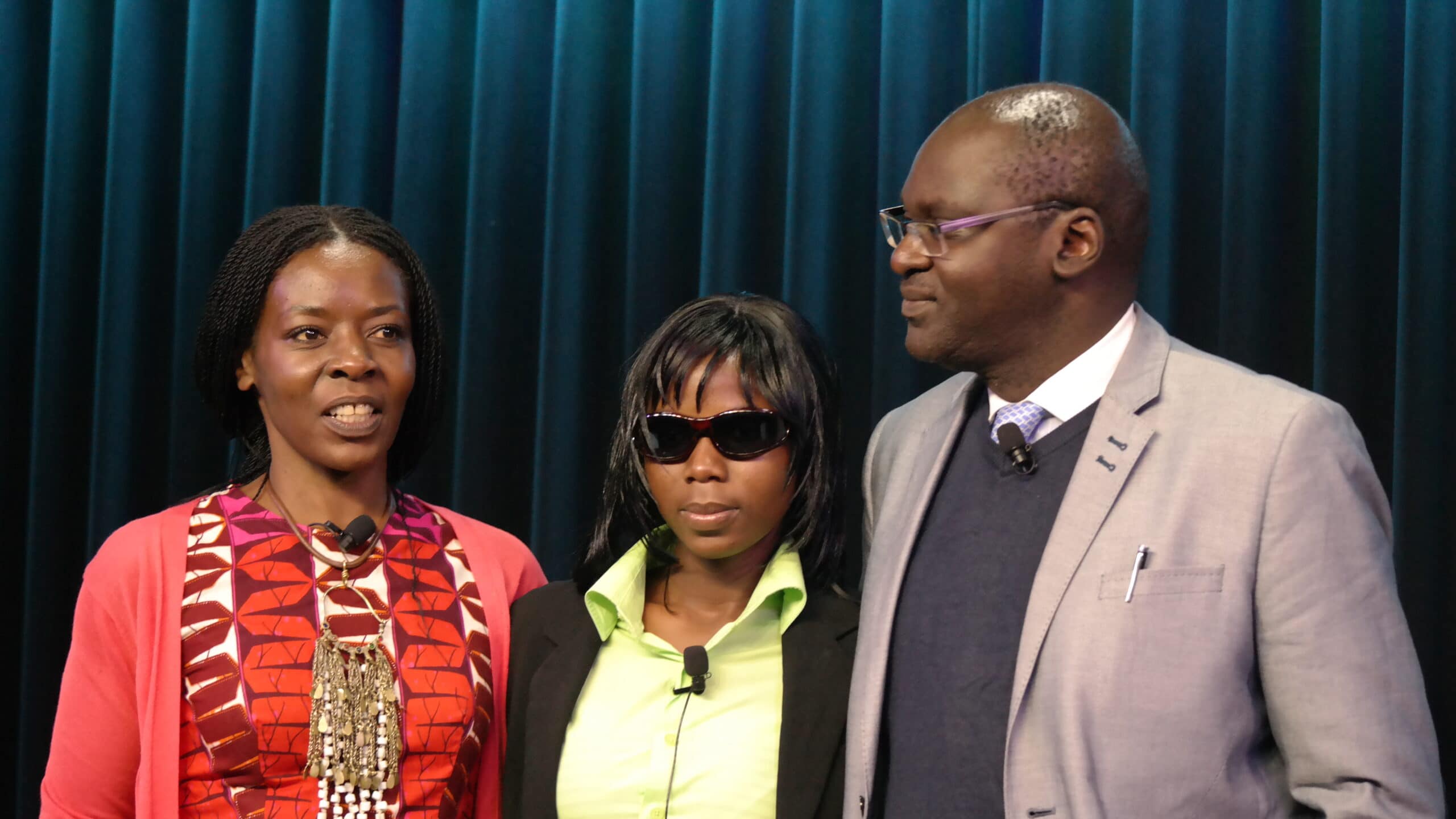
by Cindy Levin | Nov 25, 2014 | 2014, Africa, Awareness, Education, Girls, Human Rights, Humanitarian, Social Good, World Moms Blog, World Voice
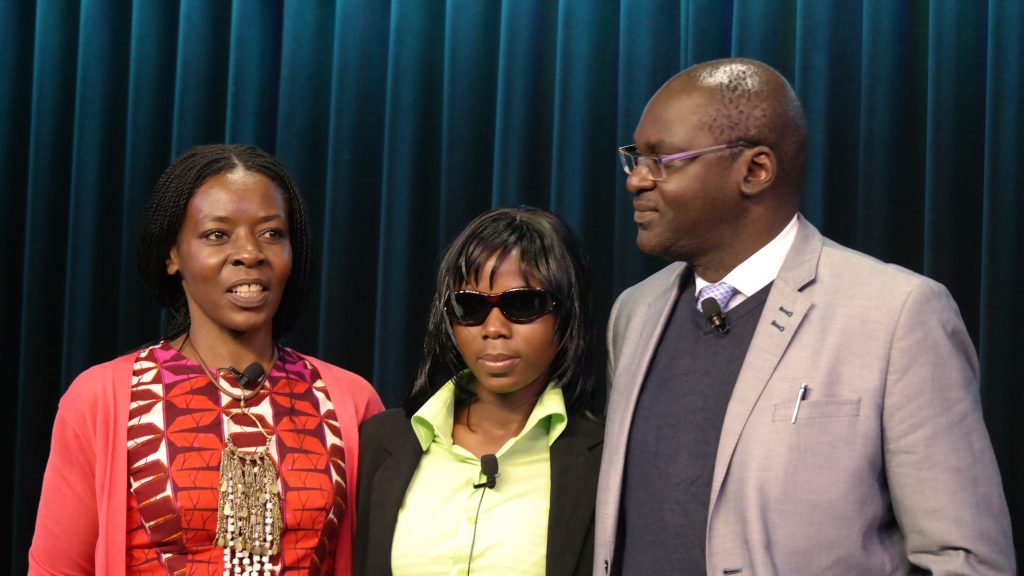
They sat in the back row of the ONE Campaign’s AYA Summit with me in Washington D.C., keeping to themselves and wearing sunglasses in an already darkened room. A computer on their laps, two teenage girls whispered to one another as together we watched videos and heard speakers talking on all ranges of topics affecting girls and women around the world. Vaccines, education, access to electricity, human trafficking, genocide…it was both a heavy and inspiring range of topics as speakers bounced back and forth between storytelling about problems and discussing solutions. Sitting with them and trying (unsuccessfully) to engage them in friendly conversation during breaks, I had no idea how intimately these topics were affecting their lives…
I sat in the back because back row chairs sit beside outlets and I could recharge my phone easily. They sat in back shadows for a very different reason. Because of uncertainty…a desire for anonymity…maybe even fear. One of the two had more immediate reason for concern than the other. Without our knowledge, she was nervously waiting all day for her turn to speak to us and tell us her story.
Her name was Saa* and seven months ago she was kidnapped by Boko Haram from her school in Nigeria.
Last April, the whole world exploded in outrage demanding for these terrorists to #BringBackOurGirls. And then…we heard nothing. Governments searched. Leaders demanded. Parents wept. And we heard nothing.
Then, as if out of the blue, Saa appeared in our midst ready to speak at the AYA Summit to a group of parents armed with laptops and 45 million social media followers.
This is her story.
On April 14, kidnappers from the terrorist group Boko Haram entered Saa’s school in Chibok with a plan to capture all the girls who studied and slept at her school. At 11:30PM, Saa and her classmates heard terrible noises of violence. Scared, she called her father and asked what she should do. He told her to stay where she was and wait for help.
No help came.
Collecting all the girls to a common area, kidnappers started burning everything from the school. Surrounded by weapons, the girls were told if they shouted or ran away, they would all be killed. Gunmen started demanding information about the location of a local mission, the location of the boys in the school (there were no boys), and where the school kept food. Two girls showed them where the food was and the guards emptied the store of food supplies.
They forced them away from the school and gathered them under a big tree, bringing vehicles including small cars and big trucks. The girls were ordered to enter big, high trucks by climbing up upon a small car and into the truck. “They said if any girl did not want to go into the trucks, she should come out and they would kill her,” Saa told us. After moving to another village, they moved the girls from trucks and started filling the car with the girls sitting on laps. There was not enough room for everyone to sit and three girls were left outside. The men asked the first girl if she was Muslim or Christian. She was Muslim, so they moved on and asked the same of the next girl who – despite being Christian – replied that she was Muslim out of fear for what they might do to her. When the third girl admitted that she was Christian under questioning, one of the kidnappers decided he should kill her right there and let the Muslim girls go. Other kidnappers fortunately intervened and convinced him not to kill her then, and there. Amazingly, those three girls were released for lack of room, but told not to turn back or everyone would be killed. Those girls ran away to the town.
As the vehicles started to travel and moved past one village, a few girls started to jump from the trucks. Saa decided for herself that she would rather jump and die than face the uncertainty of what lay ahead. She told her plan to friend saying, “I would rather that my parents have to bury me in a coffin.” Her friend agreed to jump, too. The truck continued through the middle of a forest in the dark with cars following behind. The girls waited for an opportunity when the following cars were not within sight then leapt from the trucks, Saa first and then her friend. After the jump, Saa discovered her friend had injured her leg and was unable to move very far. She helped her friend into the forest away from the road, so they would not be discovered. They moved as far as they could and slept in that spot until morning.
In the morning – with her friend still unable to travel – Saa sought out help. The first person Saa met was a shepherd. She asked him for help, but he refused out of fear for his own safety. He advised them to wait until 9 or 10 AM when some people may travel that way going to market and possibly help them. Saa argued that not many people would come by because the violence from the night before would make them afraid to come. They must move quickly because the “bad people” may follow that road again. Finally, he agreed to help and carried Saa’s friend on a bicycle.
On the road, they did meet people who were coming to look for their daughters who helped bring the girls back to Chibok. Then, they went back to their hometown. When they arrived home, Saa was reunited with her parents who met her in tears. All of her relatives were weeping because of the ordeal.
Saa didn’t cry as she related her story. She spoke softly and quickly in a matter-of-fact manner. I wondered how many times she had told her story and if sticking just to the facts helped her remain detached enough to get the story out. Even though this was only the second time she had spoken publicly about it, I imagine she must have related it many times to her family and to authorities trying to glean clues to recover her classmates who are still missing.
In the audience, we sat in shock…surprised to be in her presence and horrified by the audacity of Boko Haram to violate their freedom in this way. Most of us were mothers who had a very visceral reaction to the thought of someone stealing our daughters away in the night to be sold, raped, married, or killed.
I thought about that horrible conversation Saa’s father in which he faced a terrible choice of how to advise his daughter over the phone. Would you tell your daughter to run and risk her being shot in the back? Or would you tell her to wait for help, knowing that she might be trafficked and violated if no one comes to help? I thought about the shepherd, afraid for his life. He balked, but did the right thing in the end. I admired Saa’s skillful persuasion in arguing with him to provide aid and her courage to leap from a moving truck in the midst of a forest full of danger from animals and humans.
To my horror, on my Twitter feed that very night as we gathered around Saa to thank her for her courage and her story, I saw 25 more girls had been captured by these monsters. In a video delivered 200 days after Saa’s kidnapping, Boko Haram leaders scoff at the idea at negotiating for release along with ceasefire agreements. The group’s leader, Abubakar Shekau, flanked by gunman reportedly said, “The issue of the girls is long forgotten because I have long ago married them off…Don’t you know the over 200 Chibok schoolgirls have converted to Islam? They have now memorized two chapters of the Koran.” According to A World At School, Boko Haram claims to be holding 500 women and girls against their will.
I write this blog because the issue of the 219 Chibok schoolgirls is not forgotten. Not by Saa. Not by me. Not by a long shot. Saa told her story and gave us permission to use her picture for a very specific reason…to have us share it with others. If sharing her picture and her story is a way to get people to remember why we stand up for girls’ education and why the U.S. should put pressure on the Nigerian government to stop these atrocities and recover the victims, then that’s what I will do. And that’s what I ask you to do.
1. Continue to use the #BringBackOurGirls hashtag on Twitter. When you see news about it, tweet it to your networks and your members of Congress
2. Use Saa’s story and write your own blogs or letters to the editor about it to keep it in the media and social media
3. Be a champion for global girls’ education. As I said in my World Moms Blog post last may, What Can Americans Do for Abducted Nigerian Schoolgirls?, “The welfare of the kidnapped girls rests in someone else’s hands in the short-term, but I advocate against poverty and injustice wth an eye for the long-term. While we wait and we pray for these girls, shouldn’t we be using this anger and anguish to secure a future for all girls?”
I’d like to leave you with a happy thought about Saa’s education. Saa, her friend, and two other escaped Chibok schoolgirls have been brought to the United States where they will be able to study freely alongside other young women who don’t know what it means to live in fear for the right to learn. Her family knows she is safe. Her future is in her own hands. But she continues to fear for her classmates…as do we all. Read her story again. Think on it. Then, act on it.
*”Saa” is a pseudonym she uses for her own protection
This is an original post written by Cindy Levin for World Moms Blog.
Cynthia Changyit Levin is a mother, advocate, speaker, and author of the upcoming book “From Changing Diapers to Changing the World: Why Moms Make Great Advocates and How to Get Started.” A rare breed of non-partisan activist who works across a variety of issues, she coaches volunteers of all ages to build productive relationships with members of Congress. She advocated side-by-side with her two children from their toddler to teen years and crafted a new approach to advocacy based upon her strengths as a mother. Cynthia’s writing and work have appeared in The New York Times, The Financial Times, the Washington Post, and many other national and regional publications. She received the 2021 Cameron Duncan Media Award from RESULTS Educational Fund for her citizen journalism on poverty issues. When she’s not changing the world, Cynthia is usually curled up reading sci-fi/fantasy novels or comic books in which someone else is saving the world.
More Posts - Website
Follow Me:


by Martine de Luna (Philippines) | Nov 13, 2014 | 2014, Life Lesson, Motherhood, Parenting, Philippines, World Moms Blog, World Motherhood
Here in Manila, the Philippines, Christmas season is in full swing. Everywhere you go, there are signs of it: carols playing in the shopping centers; buildings decked out in holiday decorations; malls holding 3-day pre-Christmas sales; churches displaying the Christmas belen (Nativity) scene; people holding pre-Christmas parties and charity drives. Christmas here is a season of looking ahead to better days, and yes, also to December the 25th!
Speaking of carols, the line, “a thrill of hope” has been on my mind lately. I’ve not gotten around to bring out Christmas decorations (I’m one of those who waits til the end of November), but I have gotten around to thinking about that word “hope.” The line, of course, is from on of my favorite Christmas carols, O, Holy Night. As Christian, it means for me that I await Jesus Christ’s birth, because it holds for me “hope”, hope that He came to save the world in His coming.
Beside the belief that surrounds my religion’s commemoration of Christmas, I find the hope is something we all crave today in the world, isn’t it? With all the tragedy around us, the terror, the fear of disease… hope can often seem far away from our present reality.
And yet, it is always there. Thanks to efforts from the global community of “hope bearers” (like those mentioned this post on #BringBackOurGirls, or this post on the #AYA Summit), there is dialog going on; there is ACTION being taken. And by who? Well, at least for those in our community of global moms, women, mothers. As natural givers of life, I believe we as women are truly blessed with the capacity to HOPE. We know it all too well, during those nine or so months, for instance, when we bear that precious cargo in us!
I know it all too well, right now, in fact. As a second-time mother this coming 2015, I wait in hope for my baby daughter to arrive. I know I have hopes for her, too. For myself, I hope that I will be a good mother to two kids! (Help!) In fact, as I write this, she is kicking me vigorously and giving me quite a tiring episode, haha! I’m both tired and delighted to feel her kicks. Each one is a reassurance that all is well, and that I will see her really soon.
These “thrills of hope” — these summits we attend, the causes we support, the people we advocate through compassion and efforts to give — these all enthral us to ACT on hope. It amazes me that we have the energy to live outside of ourselves, of our own families, our children. And yet, it is right that we do, isn’t it? Because if there is anyone who can better relate to “thrills of hope” — and give fire to that hope — then it is us, world moms, from wherever we are around the globe.
What are your current hopes — for family, for yourself, or for the world around you? They can be big or small, or whatever. What’s important is to never lose faith in what’s possible!
This is an original post by Martine de Luna for the World Moms Blog.
Martine is a work-at-home Mom and passionate blogger. A former expat kid, she has a soft spot for international efforts, like WMB. While she's not blogging, she's busy making words awesome for her clients, who avail of her marketing writing, website writing, and blog consulting services. Martine now resides in busy, sunny Manila, the Philippines, with her husband, Ton, and toddler son, Vito Sebastian. You can find her blogging at DaintyMom.com.
More Posts

by Cindy Levin | Nov 11, 2014 | 2014, Awareness, Elections, USA, World Events, World Moms Blog, World Voice

Cynthia and her daughters take a family selfie after voting
I’m an American and I voted on November 4th. I’m guessing that most of the global readership of World Moms blog didn’t follow our elections because this is not a presidential election year, but that’s okay. A lot of Americans didn’t either. That’s not okay.
Shamefully, only 38% of Americans voted in this November 4th election, which means 6 in 10 of us didn’t vote.
But that’s life. Low voter turn out in the off years of politics is just the way it goes. People tune out without the razzle-dazzle of a presidential slugfest and a new Congress is elected. But, now what do we do if we want to make our country better? Do we have to wait another two years to have a say? No. Not at all!
As angry as some people in my country tend to get with the leader of our country, the president of the United States is not the only one who has influence over policies that have wide-reaching impact on the lives of Americans and all residents of planet Earth. Members of Congress are elected to represent us in our 50 states and have their own measure of power on domestic and global affairs that can help or hinder a presidential agenda. For instance, the president can make budget recommendations, but only Congress can approve the actual spending of money. Budget decisions, foreign aid policies, gun laws, environmental policies, and a host of other choices are made by senators and representatives all year round.
This leads me to my main point. Election day is not the only day when Americans have a voice in government.
Since important decisions are being made every day, then every single day is an opportunity for Americans to shape U.S. policies whether it be through tweeting, blogging, writing letters to the editor, calling members of Congress, writing handwritten letters to Congress, or meeting face-to-face in Congressional offices. All of these actions are open to us. It is our right as citizens. (By the way, even if you’re not a citizen you can still write to U.S. newspapers or use Twitter to organize)
The idea that Americans can only affect what our government does only once every 4 years is a naive and antiquated notion.

U.S. Representative Jan Schakowksy of Illinois reads a letter from Cynthia’s children about supporting global child survival programs.
TV news – or any news, really – would lead anyone to think that voting or contributing large amounts of money are the only things that citizens can do. When so many people don’t know what kinds of effective actions they can personally take, most people end up just frustrated and giving up on our system without ever truly being a part of it. That’s the bad news. The good news is that this huge gap between most citizens and government creates space for concerned citizen lobbyists to slide right in and have great impact. I’m talking about everyday, concerned citizens just like you!
Even a modest amount of 10-20 phone calls on a topic can sometimes greatly influence a member of Congress because few Americans really bother to do it. A constituent meeting face-to-face with congressional staff or an actual member of Congress is even more rare and makes even more impact. These simple actions can have a great effect, especially if it’s an important yet little known issue.
Take, for example, funding to fight tuberculosis (TB), a highly contagious airborne disease. Most people in the U.S. think it doesn’t even exist anymore if they’ve ever thought about it at all. The truth is that in 2012, 8.6 million people fell ill with TB and more than 1.3 million people died from it, making TB the most deadly curable disease in the world. 95% of cases happening in low or middle-income countries, but since it spreads through the air when an infected person coughs, sneezes, or talks it can jump to wealthy nations even easier than Ebola. If treated improperly or ignored, it gives rise to forms of multi drug-resistant TB, which are far more difficult and costly to treat. RESULTS volunteer advocates keep up the drumbeat to members of Congress to fund the very inexpensive treatments to save lives across the globe and in the U.S. to make a tremendous impact on the dignity and income of people in poverty who can keep working in good health. Since no one is actually lobbying against saving lives from TB, a relatively small number of volunteers can educate their elected officials about it and have a huge impact on global health to the tune of $1.1 billion in new resources last year and $1.4 billion overall for the Global Fund to Fight AIDS, TB and Malaria. All this is done by earnest citizens voicing opinions without the media circus of an election cycle.
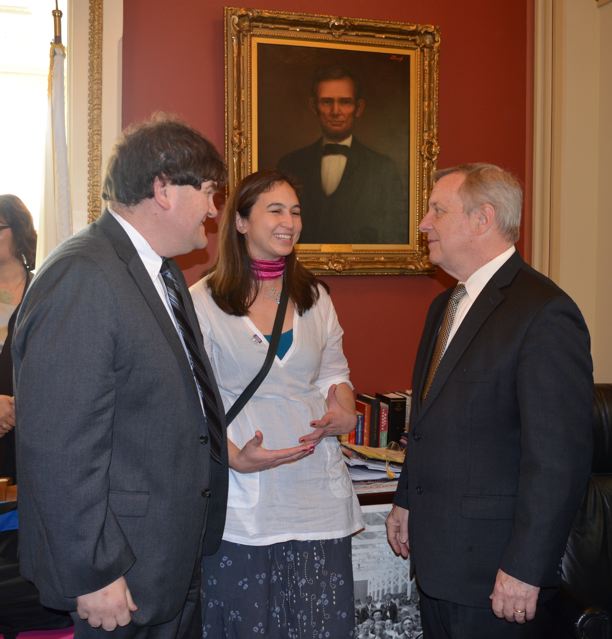
Cynthia and fellow RESULTS activist Richard Smiley talk to U.S. Senator Dick Durbin of IL about microfinance
Every election day, I encourage my fellow Americans to get out and vote, to be sure! That’s where engaged citizenship starts. But we shouldn’t stop there. Let our elected officials know what you want after they’re in office even if – especially if – they are not of the party you favor. Get involved with an advocacy group that shares your global outlook and desires to help mothers and children. (ONE, RESULTS, Shot@Life, and Bread for the World are great places to start) In our country, senators and representatives represent are supposed to work for US. It is your right and privilege to contact them on the issues that are important to you. Don’t waste it!
This is an original post written by Cindy Levin for World Moms Blog.
Do you vote?
Cynthia Changyit Levin is a mother, advocate, speaker, and author of the upcoming book “From Changing Diapers to Changing the World: Why Moms Make Great Advocates and How to Get Started.” A rare breed of non-partisan activist who works across a variety of issues, she coaches volunteers of all ages to build productive relationships with members of Congress. She advocated side-by-side with her two children from their toddler to teen years and crafted a new approach to advocacy based upon her strengths as a mother. Cynthia’s writing and work have appeared in The New York Times, The Financial Times, the Washington Post, and many other national and regional publications. She received the 2021 Cameron Duncan Media Award from RESULTS Educational Fund for her citizen journalism on poverty issues. When she’s not changing the world, Cynthia is usually curled up reading sci-fi/fantasy novels or comic books in which someone else is saving the world.
More Posts - Website
Follow Me:


by World Moms Blog | Nov 10, 2014 | 2014, World Interviews, World Moms Blog

On December 9th, 2014, WorldMomsBlog.com, a global community for women that writes from over 20 countries on motherhood, culture, humans rights and social good, will join media influencers and top government officials at The White House in Washington, D.C. The goal of the discussions will be “to increase awareness among young people and encourage their participation in educational, cultural and professional exchanges.”
“I am extremely honored and enthusiastic to be invited into the conversation around millennials and global and cultural exchanges at the home of the President of the United States of America.” — Jennifer Burden, Founder of WorldMomsBlog.com
In 1993 Jennifer won a scholarship from her hometown of Brick Township’s Board of Education to live with a family in Japan for a summer during high school. Her experience through Youth for Understanding was life-changing, and she still remains close friends with the Miyaji family in Japan.
“We’ve attended each other’s weddings, watched our families grow and exchanged support during tragic events of September 11th, 2001 and the tsunami that impacted Japan in 2011. It has been a mind opening experience to have such a connection with a family elsewhere on the globe, similar to the connections we are now making to mothers through World Moms Blog.”, says Burden.
However, Jennifer is just one of the many WorldMoms Blog.com community with a story of an early experience abroad that has made an impact. The invitation to The White House inspired us to ask our globally minded contributors about their early abroad experiences, if any. What we learned may surprise you!…
Our contributor, Ana Gaby from Stumble Abroad, is a Mexico native, who studied abroad in Canada during high school and in France in college. Karyn Van Der Zwet of Kloppenmum in New Zealand worked in London for four years during her 20s. And, Jennifer Iacovelli of Another Jennifer studied abroad in London, England while a junior at Syracuse University in New York, USA.
Dee Harlow, The Wanderlustress has lived all over the world and is now in Lesotho. She told us that during her 20s she was working abroad from the US in Singapore. K10K in Belgium of The Penguin and the Panther volunteered in Rumenia fixing up a local birth clinic and in Morocco helping to install an irrigation system in her early 20s. In fact, her husband proposed to her on that Morocco trip!
Kristyn Zalota of Cleanbirth.org went to Russia on an exchange just after the Soviet Union collapsed. And in college she did a semester in Luxembourg and went back to Russia after graduating and lived with a family. While, Kirsten Doyle of Running For Autism in Canada grew up in South Africa and lived and worked in Israel at age 23. She started on a kibbutz and then worked on farms.
Elizabeth Atalay of Documama spent a summer in Israel at age 17 after high school, a summer in Bolivia as college student at age 19 and backpacked around South America for the summer at age 21 and for 6 months through Africa when she was 24. She also spent four months backpacking around Asia/Pacific at 26 after college pursuing her work as a documentarian!
Jennifer Prestholdt, The Human Rights Warrior, took a semester off from Yale University when she was 20 and enrolled as a Norwegian student at the University of Oslo’s faculty of political science. She also worked at a barnehage (day care center) when in Norway. During law school, she spent two summers living in Geneva and working at the United Nations.
Nicole Morgan of Sisters from Another Mister went to college in South Africa, then spent a year traveling Europe, where she backpacked through Italy, Greece and Turkey. She volunteered for a while with the YWCA, and then spent six months working in a London advertising/graphics company while waitressing at night. Polish Mom Photographer, grew up in Poland and worked as an au pair as part of a cultural exchange program in U.S when she was 26. She also worked as a waitress in London, England for 2 months when she was 21!
Susie Newday of New Day, New Lesson grew up in the US and went on a program to Israel when she was 18. She lived and worked on kibbutz, and now resides in Israel. And, Olga Mecking, The European Mama, grew up in Poland and studied french in Nancy, France for a month. She then went on to study in Germany for a year, went to Canada for 4 months and then moved to Germany. She has now been living in the Netherlands for the past 5 years.
Tina Santiago-Rodriguez, Truly Rich Mom, of the Philippines grew up and studied in Brunei from kindergarten to secondary school, and then went back home to the Philippines to attend college. After graduating, she became a mission volunteer for her Catholic lay community and was assigned to Borneo (East Malaysia and Brunei) and Timor Leste for about 2 years, to do ministry work for youth and kids. She was then assigned to Manila for a year, then to Timor Leste with her parents and fiance for another year, before getting married at 26. She returned to Timor with her husband as newlyweds and stayed for another 4 years or so before returning to the Philippines.
Nicole Melancon, the Thirdeyemom, studied in Paris when she was 21 and worked as a fille au pair (nanny) and French intern the following year. While, Hannah Ashton moved to the US from the UK when she was 17, went to university in the US, but did her junior year back in the UK. She ended up staying in the US for three years after she graduated. And, Erin Threlfall went to Germany to study at a university and then went volunteered at a refugee camp in Ghana, where she stayed for 11 years!
Sophia Neghesti Johnson of Think Say Be from Tanzania volunteered in Santa Cruz, CA at Bosch Baha’i School for a year at 18. She then studied in Los Angeles, CA and Tampa, FL in her mid 20s with a focus on psychology. At 24 she worked as a freelance photographer for celebrity events in Los Angeles, CA, & has continued freelancing in Florida to sponsor girls’ education in Zanzibar at Regeza Mwendo School.
Our contributor, Anne Marie Wraight in Greece, went to Germany on a cultural exchange programme from the UK. Her choir and orchestra played several concerts together with the youth orchestra from Berlin. They also had a musical to perform which was a great hit!!! She was part of a group that stayed with the musicians from the host orchestra so they could practise our foreign language skills. This exchange took place every 2 years. She says it was, “Great on EVERY level of cultural exchange!”As a result of the experience, Anne Marie did her gap year in Berlin, where she volunteered with retired people who lived on their own and had special needs and taught English. She then moved to Greece in her early 20’s and still resides there today!
Jennifer Burden will be bringing these stories of the WorldMomsBlog.com community and more to Washington. The invitation to The White House is a big milestone for World Moms Blog, and we are over the moon about including our community in these top-level discussions of global importance for students and young adults! This honor is a true reflection of the hard work of our entire global editing and contributing staff toward running the site and opening minds to what life is like for mothers all over the world. Congratulations to every single World Mom!!
Did you travel abroad when you were in your teens or 20’s on a trip that has impacted your life? Tell us your story in the comments, and we will take it to Washington!
WorldMomsBlog.com is a community that shares the stories of over 60 contributors from over 20 countries on motherhood, culture, human rights and social good. We have been named a FORBES Woman Best Website for Women, ’12 & ’13; a NY Times Motherlode “must read” and recommended in the “The Times of India”.
World Moms Blog is an award winning website which writes from over 30 countries on the topics of motherhood, culture, human rights and social good. Over 70 international contributors share their stories from around the globe, bonded by the common thread of motherhood and wanting a better world for their children.
World Moms Blog was listed by Forbes Woman as one of the "Best 100 Websites for Women 2012 & 2013" and also called a "must read" by the NY Times Motherlode in 2013. Our Senior Editor in India, Purnima Ramakrishnan, was awarded the BlogHer International Activist Award in 2013.
More Posts

by Karien Potgieter | Nov 5, 2014 | 2014, Africa, Being Thankful, Exercise, Family, Health, Kids, Life Balance, Motherhood, Nutrition, Parenting, Priorities, Running, Siblings, South Africa, Working Mother, World Moms Blog Writer Interview, World Motherhood, Writing
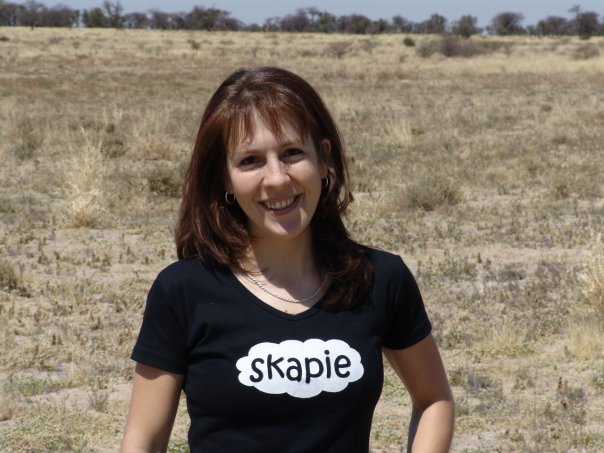 Where in the world do you live? And, are you from there?
Where in the world do you live? And, are you from there?
I live in Kimberley, the diamond capital of South Africa. Kimberley is a smallish, dusty town that gets extremely hot in summer – living here sometimes requires a good sense of humour, ha! I was born and raised just a short distance from here – in Bloemfontein in Central South Africa.
What language(s) do you speak?
Our home language is Afrikaans, but I’m fluent in English as well. South Africa has 11 official languages, plus a number of unofficial ones, so I’m really far behind as far as that goes!
When did you first become a mother?
I was blessed with a beautiful, peaceful little girl at the beginning of 2012 at the age of 34. My son, a busy, happy little guy, was born 22 months later at the end of 2013. It’s been an overwhelming, busy and blessed two-and-a-half years – what an amazing adventure!
Is your work: stay-at-home mom, other work at home or do you work outside the home?
I’m in the very privileged position to work from home as an ecologist. I feel extremely blessed to be able to be here for my kids all day (we have a nanny who looks after them while I work) and be able to do a job that I love.
Why do you blog/write?
Writing is my passion – I love, love, love it! Combining writing with my other passions, namely my kids, running and healthy living, is pure bliss.
How would you say that you are different from other mothers?
I’m quite a health nut! At the age of two-and-a-half my daughter has never seen or tasted something like a soda and very rarely eats junk food – we just don’t keep it in our house. She and her brother both love fruits and veggies – perhaps because it’s all they know? I also love running with both kids in our double jogging stroller – it’s one of our favourite things to do!
What do you view as the challenges of raising a child in today’s world?
There are so many! Keeping them safe in a country known for its high crime rate; teaching them to value and accept themselves in a society where pressure is immense to be and look a certain way; teaching them to respect others in a world where respect for others is on the decline; teaching them to be active and take care of their bodies in a world where technology makes everything so easy… The list goes on and on. Only by grace!
How did you find World Moms Blog?
I love reading about other mothers’ experiences on this crazy adventure called motherhood. An online search led me to World Moms Blogs, where I’ve found so many inspirational stories about moms from all over the globe – I love it!
This is an original, interview post for World Moms Blog from our new writer in South Africa and mum of 2, Karien Potgieter. You can read more about Karien’s running adventures through life at her personal blog: Running the Race
Karien Potgieter is a full-time working mom of two toddlers. She has a master’s degree in ecology and works in the conservation sector in beautiful South Africa. Her other big passion, apart from her family and caring for the environment, is running. To date she’s participated in races on three continents and in six countries and she dreams of travelling to and running in many, many more. You can follow her and her family’s running adventures on her blog, Running the Race (http://www.runningtherace.co.za).
More Posts - Website
Follow Me:





by Jennifer Iacovelli | Nov 4, 2014 | 2014, Africa, Awareness, Blogging, Girls, Human Rights, Humanitarian, Inspirational, International, Maternal Health, Millennium Development Goals, ONE, Social Good, Vaccines, Womanhood, World Bank, World Moms Blog
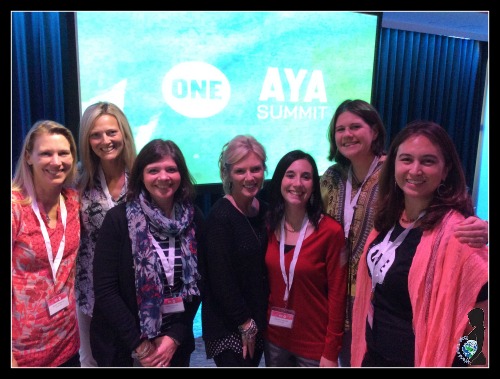
It has been almost two weeks since I attended the AYA Summit in Washington DC at Google’s offices with ONE, and I still feel a flood of emotion each time I think about the experience. As I wrote on my blog last week, the words to explain such a powerful and inspiring event are hard to come by.
The AYA Summit focused on issues facing girls and women in the developing world, with a special emphasis on Sub-Saharan Africa. The name AYA comes from an African Adinkra Symbol, which means fern and symbolizes endurance, resourcefulness and growth.
I, along with fellow World Moms Blog contributors Jennifer Burden, Elizabeth Atalay, Nicole Morgan, Nicole Melancon, Kelly Pugliano and Cindy Levin, sat in a room of about 80 bloggers and listened to inspiring panel after inspiring panel. In addition to thought-provoking conversations about human trafficking, the importance of vaccinations, electrifying Africa, making change through economic opportunities and the dire need to end Ebola in West Africa, we witnessed incredible performances by a young poet named Marquesha Babers and actress Danai Gurira.
Tears were shed. We were all moved and left wanting to do more for women and girls around the globe.
Why invite only bloggers to such a powerful event? According to this article from WUSA9 who covered the event, the combined audiences of our blogs exceeds 45 million and 28 states. As it was noted, “that kind of reach is priceless.”
There was a general theme of storytelling throughout the event. As bloggers, we have the ability to tell the stories of girls and women around the globe that the mainstream media simply cannot duplicate. We use our experiences as women, mothers and global citizens to lend our voices to those who don’t have a microphone and help others join in the conversation. We personalize the stories, talk about our concerns, and amplify the issues that media may not even be fully aware of or willing to devote the time to cover.
As Ginny Wolfe, Senior Director, Strategic Relationships at ONE, said at the very start of the AYA Summit, “We’re not asking for your money, we’re asking for your voice.” If you are reading this post, you can lend your voice too.
Though it is still hard to put into words what the AYA Summit meant to me, I thought I would share the highlights and key takeaways through a series of tweets during the event:
Read what other World Moms are writing about the event:
For more on the AYA Summit and the work that is coming from the event, visit and follow the AYA Summit 2014 Flipboard.
This is an original post written for World Moms Blog by Jennifer Iacovelli who also writes at www.anotherjennifer.com.
How will you or do you use your voice to stand up for those who are unable to speak up for themselves?
Jennifer Iacovelli is a writer, speaker and nonprofit professional. Based in Brunswick, Maine, she’s a proud single mom of two boys and one Siberian husky. Jennifer is the author of the Another Jennifer blog and creator of the Simple Giving Lab. Jennifer is also a contributing author of the book The Mother Of All Meltdowns. Her work has been featured on GOOD, BlogHer, USAID Impact, Feed the Future and the PSI Impact blog. Her latest book, Simple Giving: Easy Ways to Give Every Day, is available everywhere. Her passions are writing, philanthropy, her awesome kids and bacon, though not necessarily in that order.
More Posts





